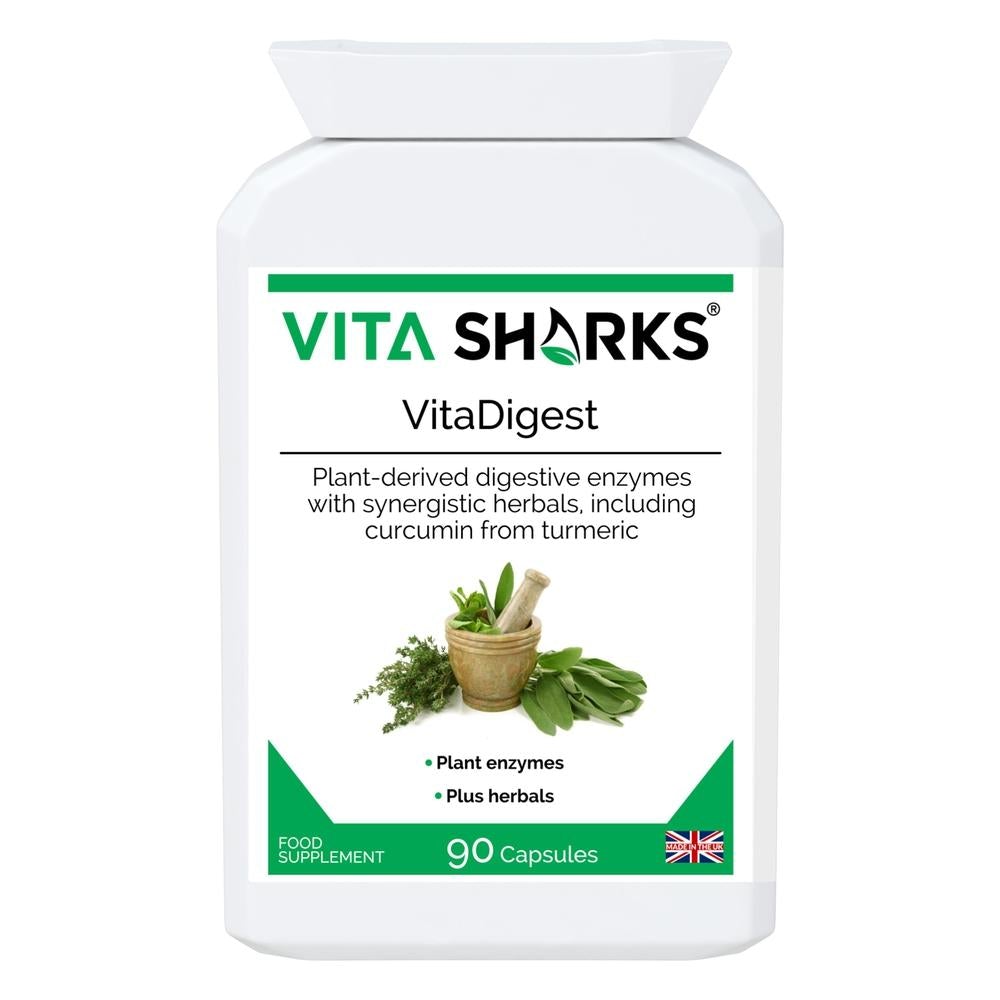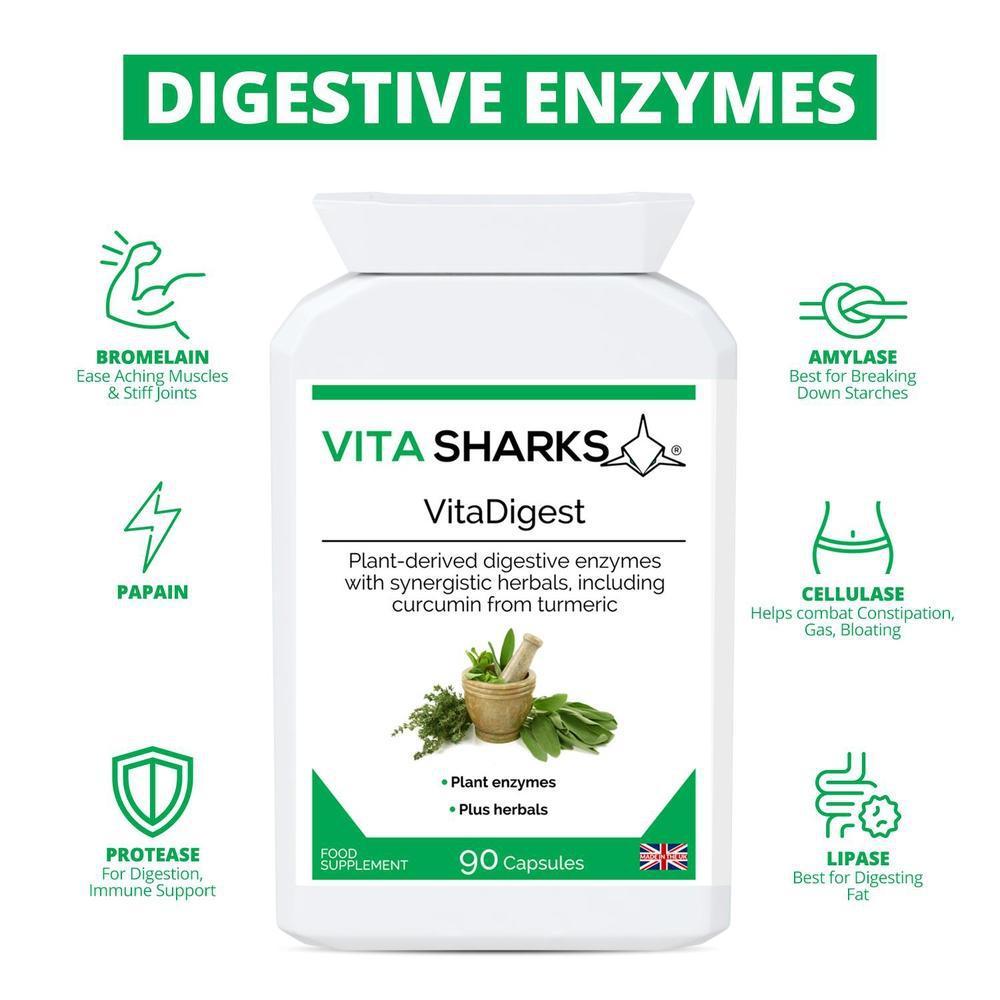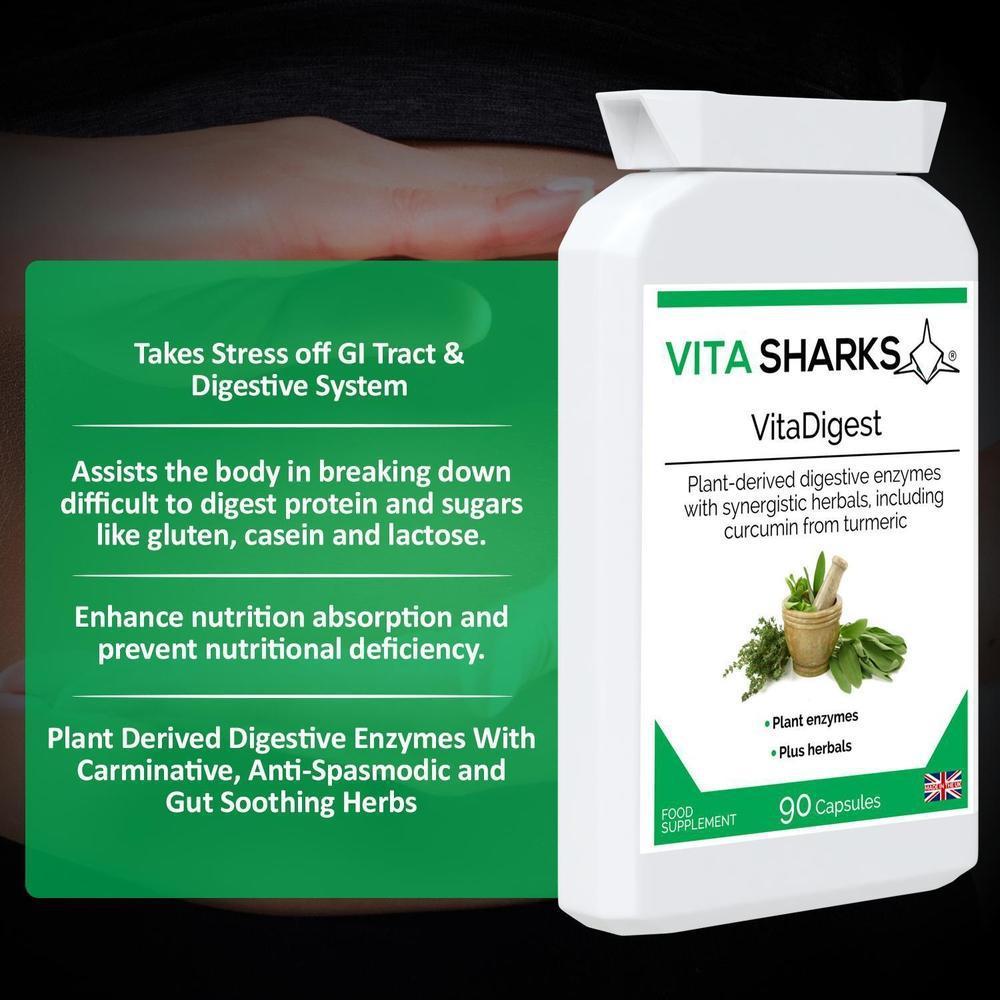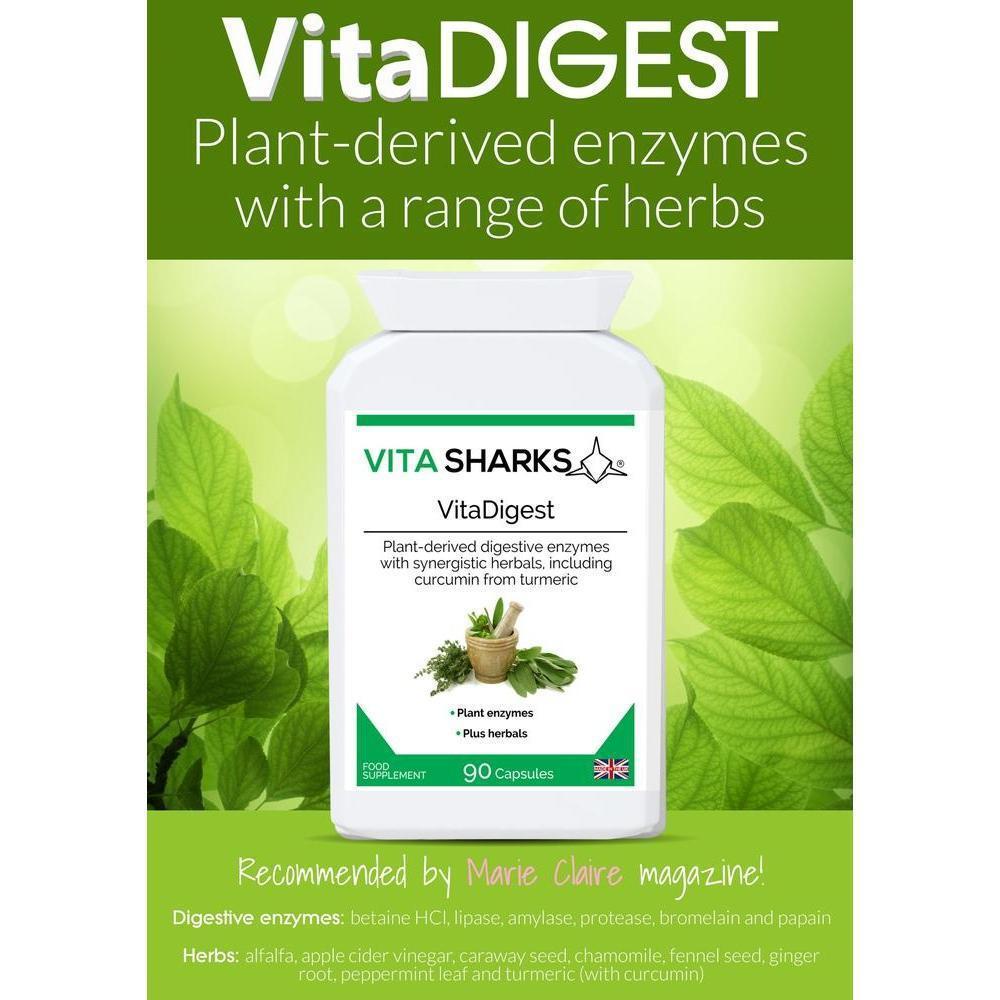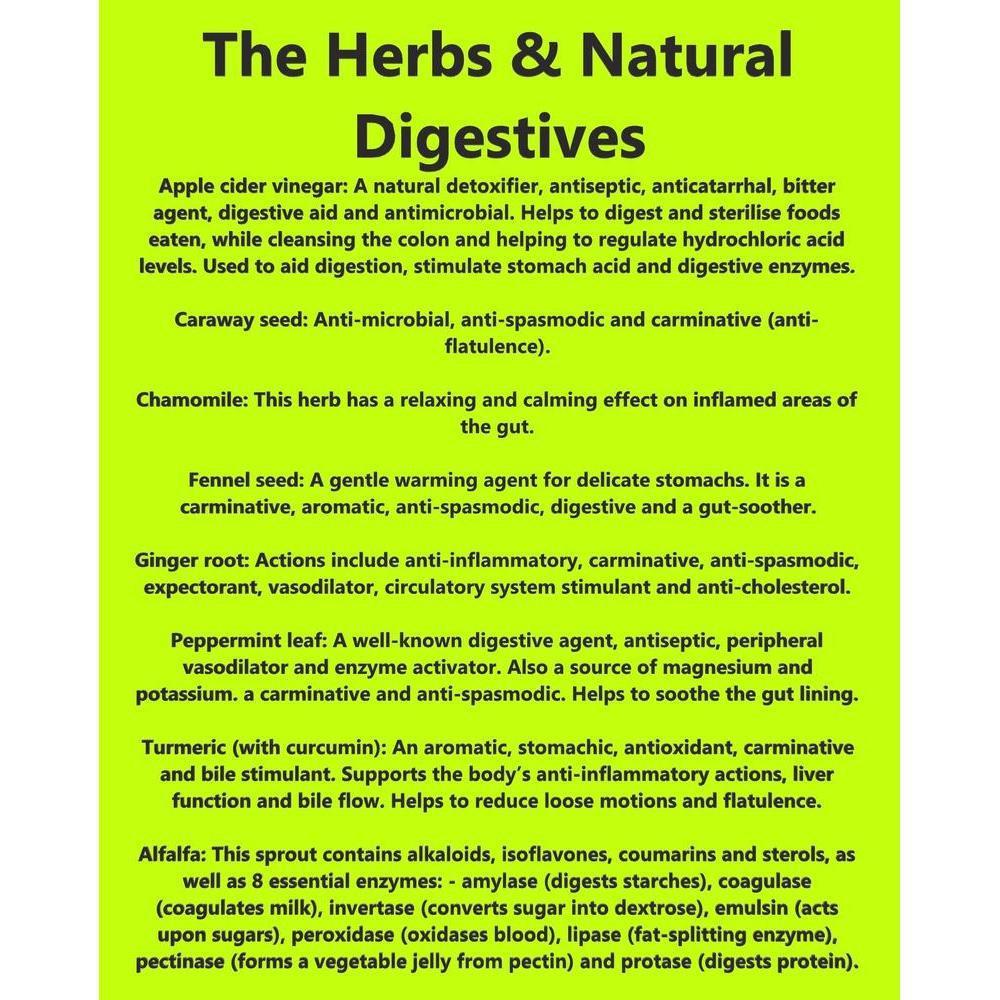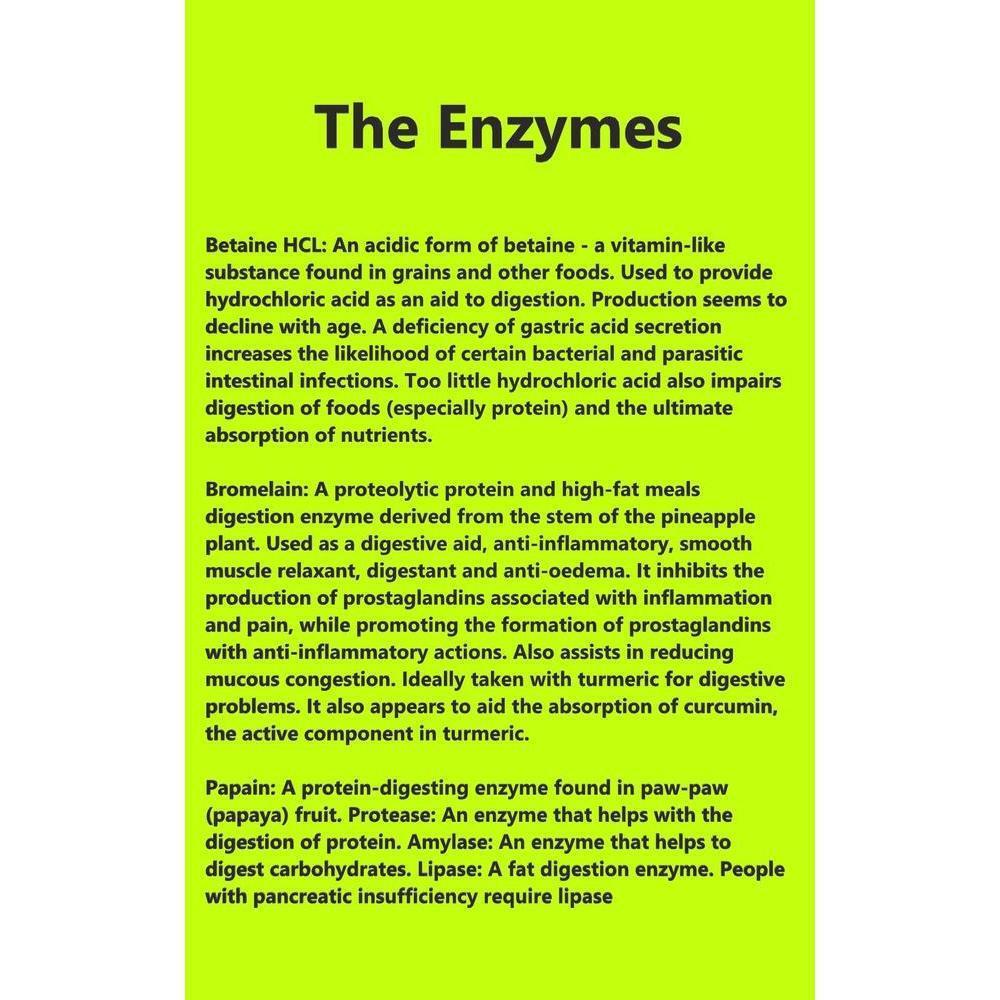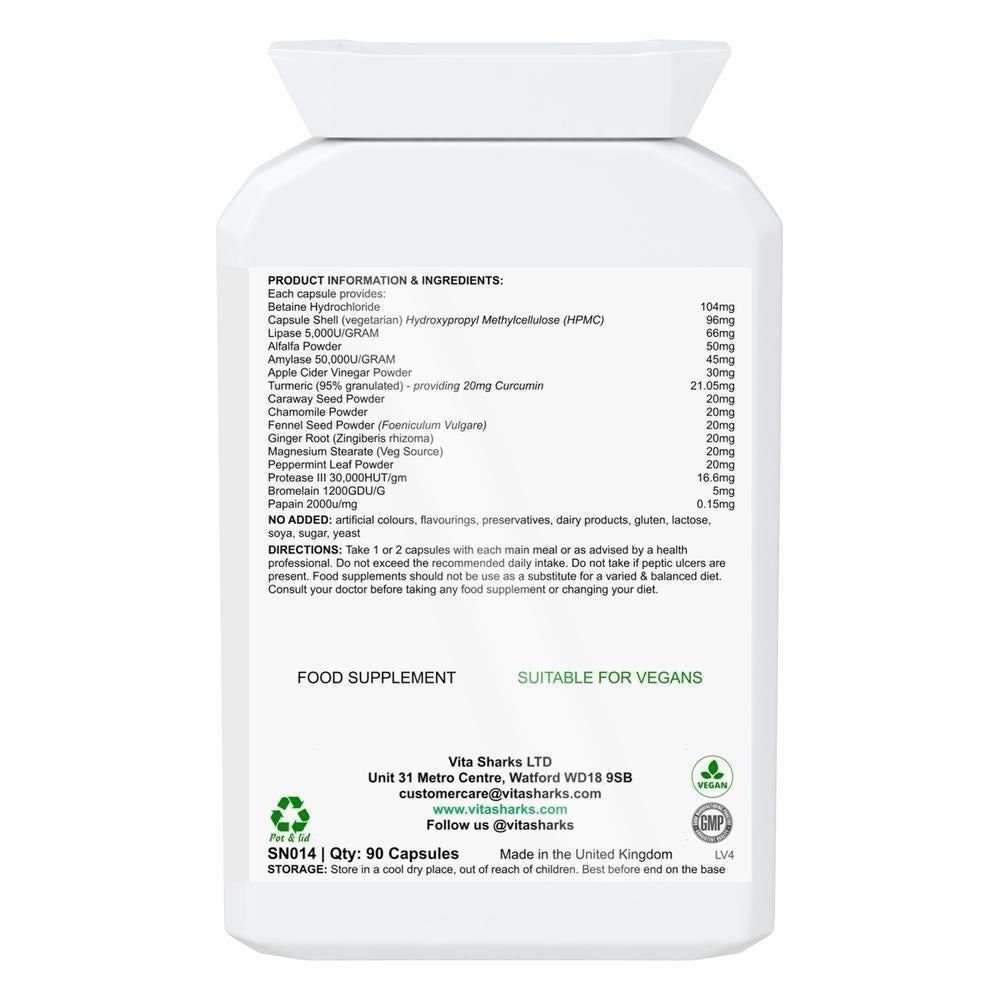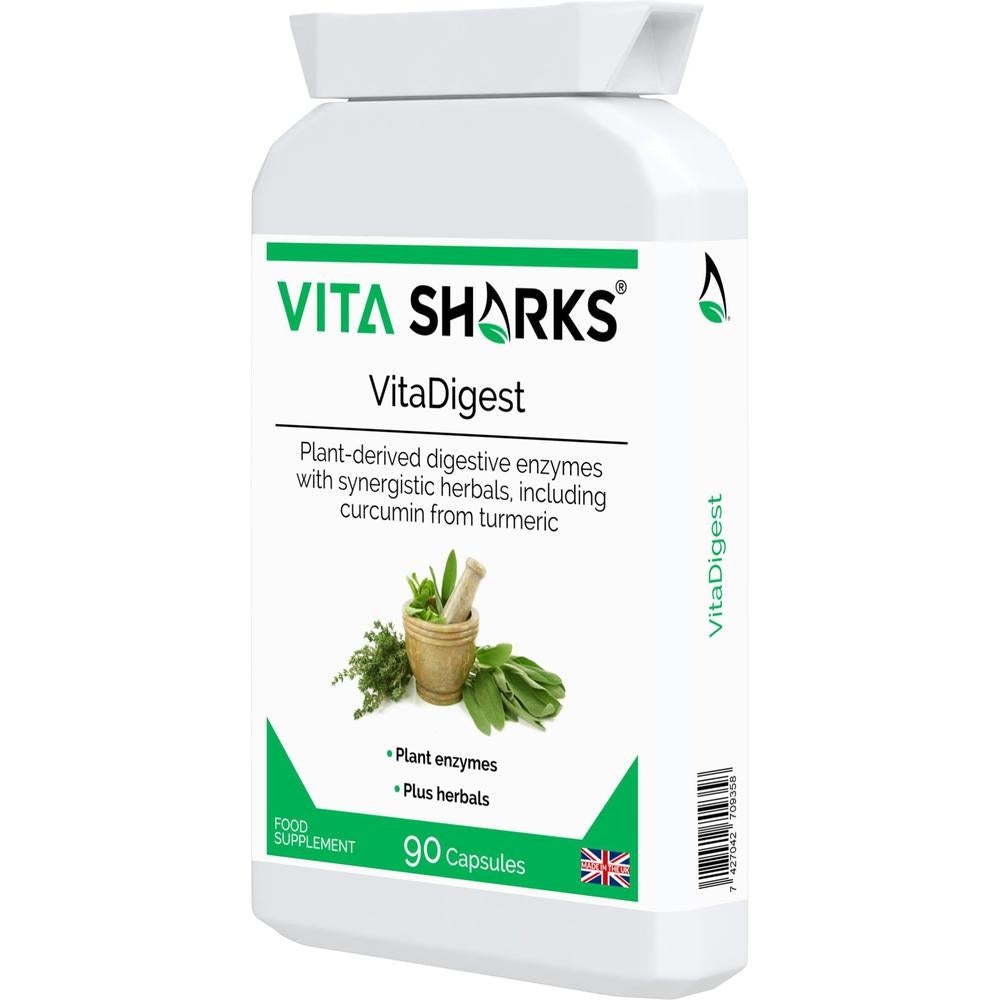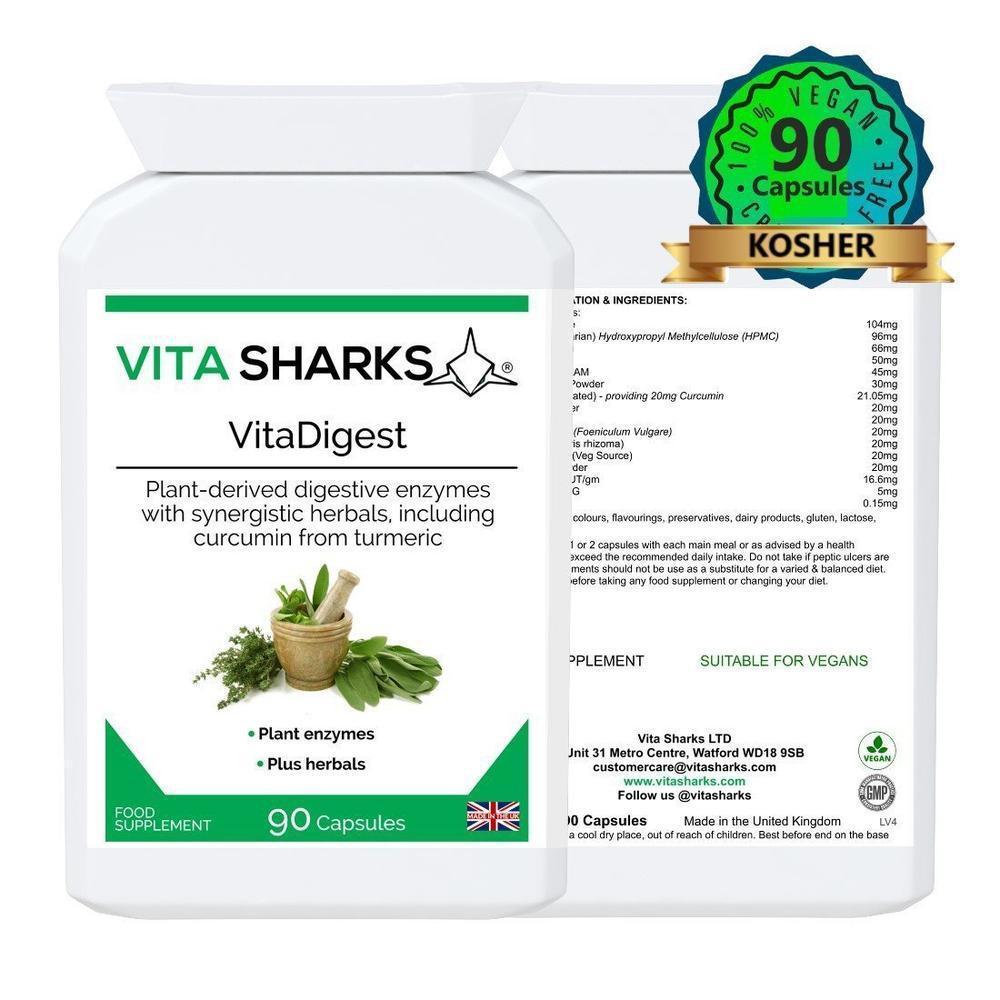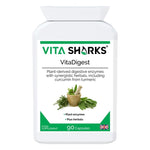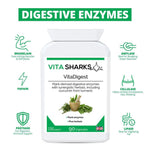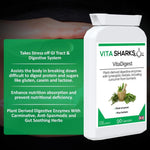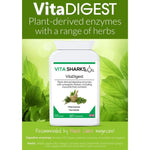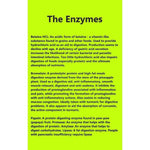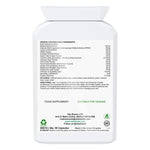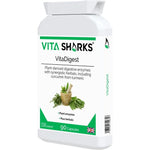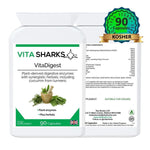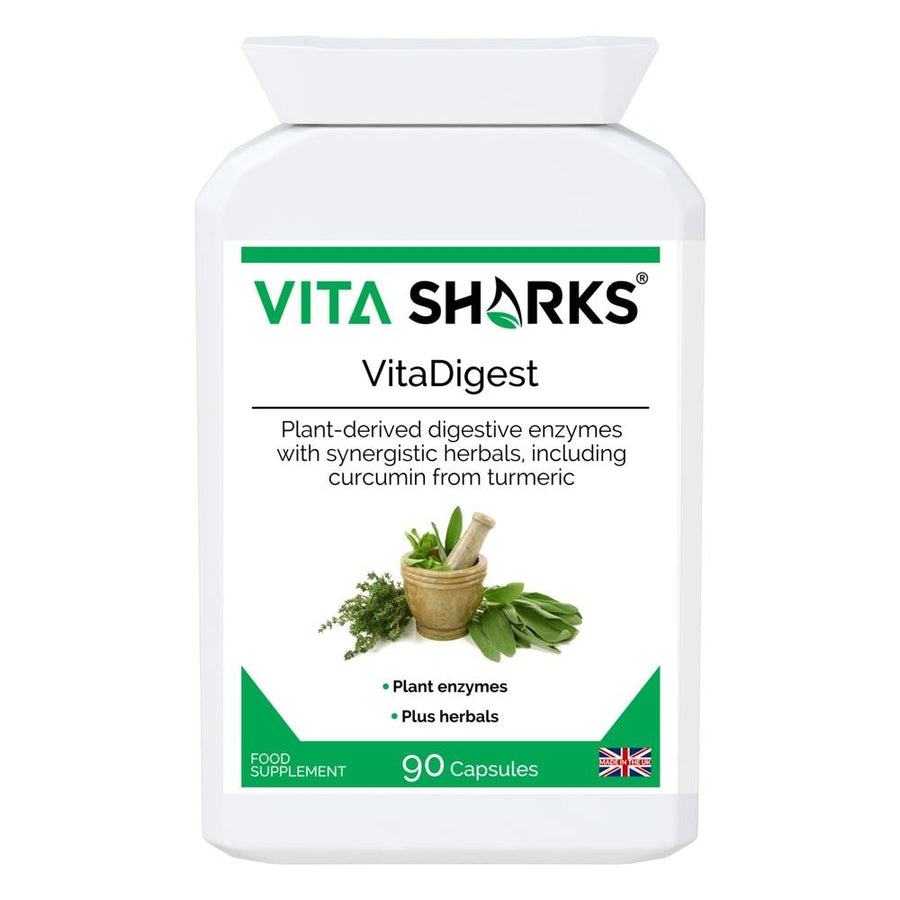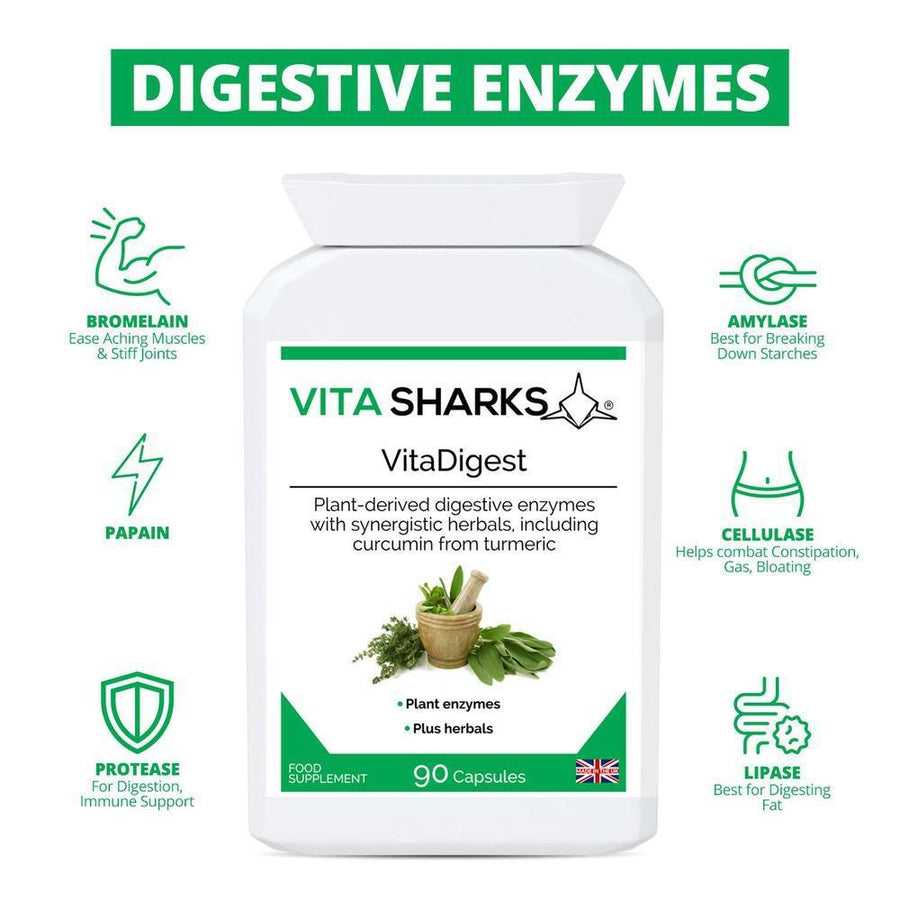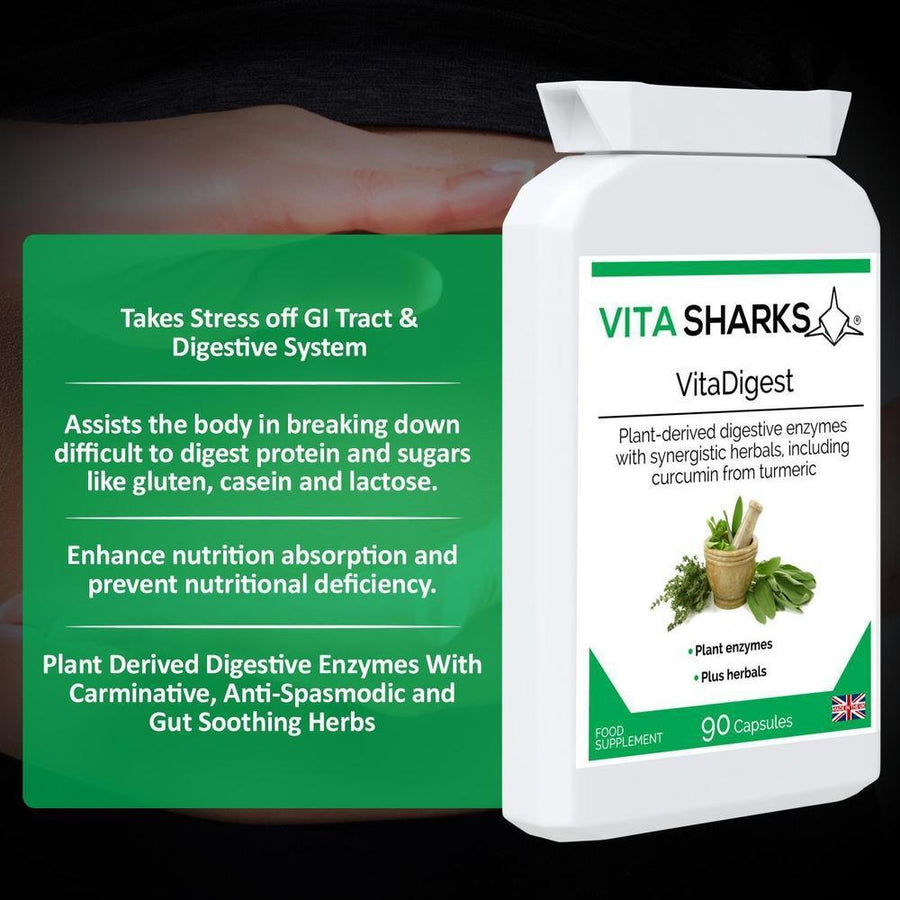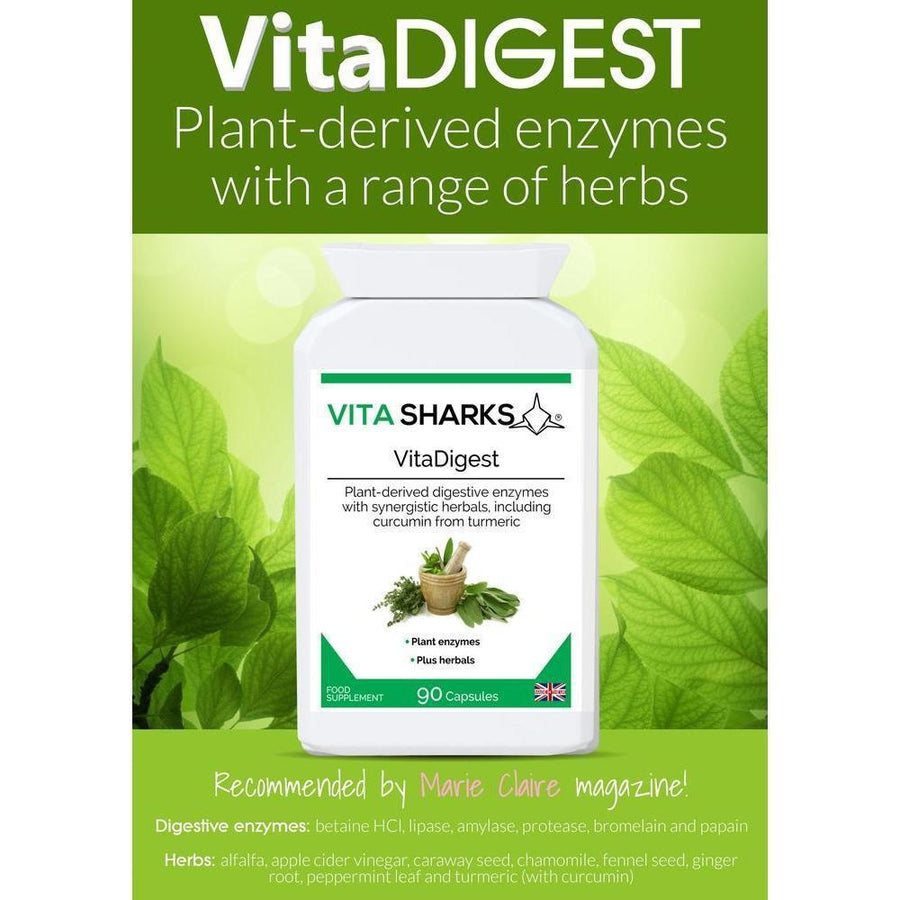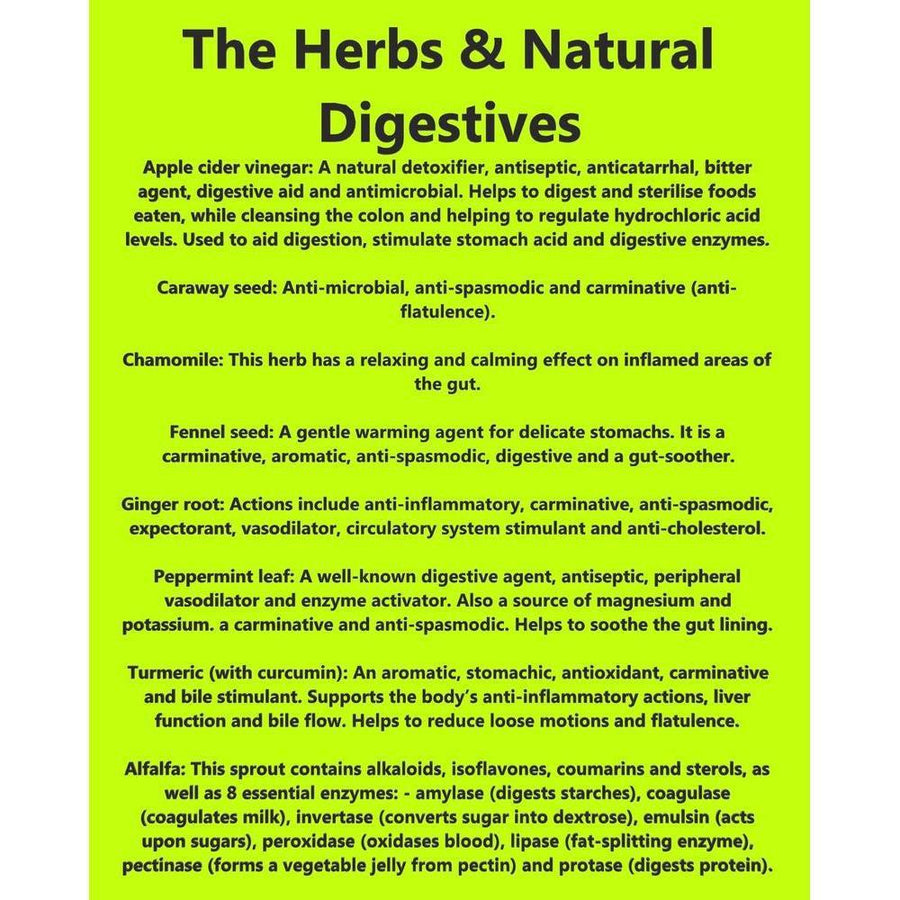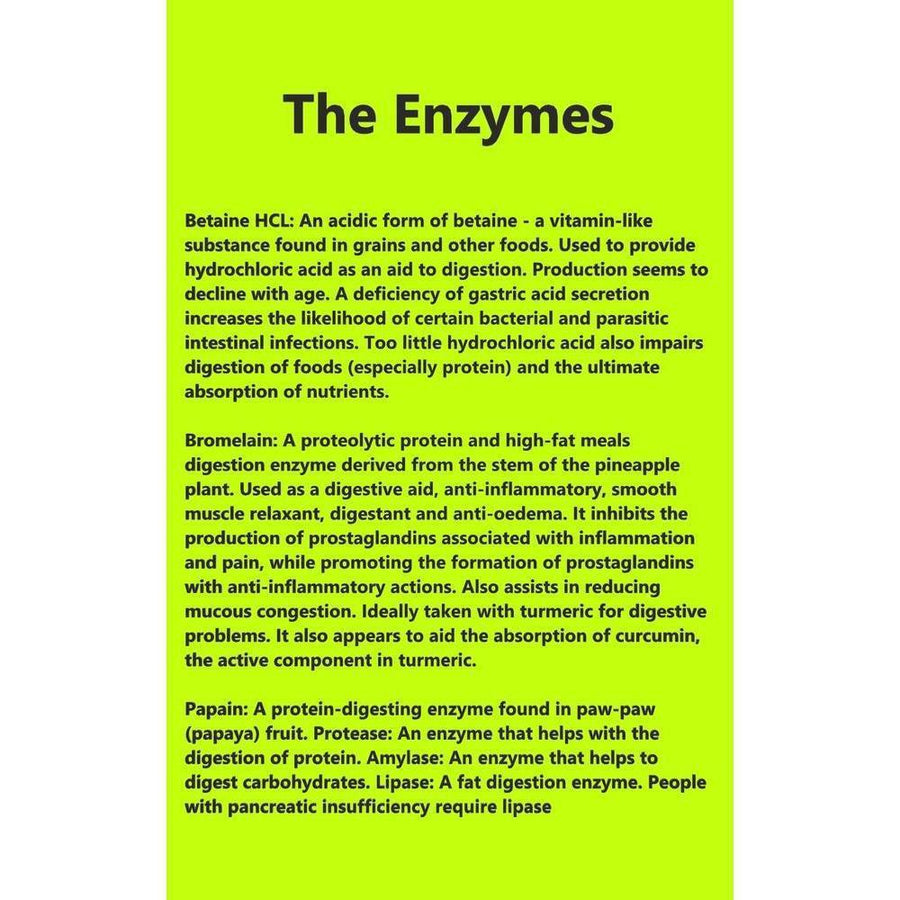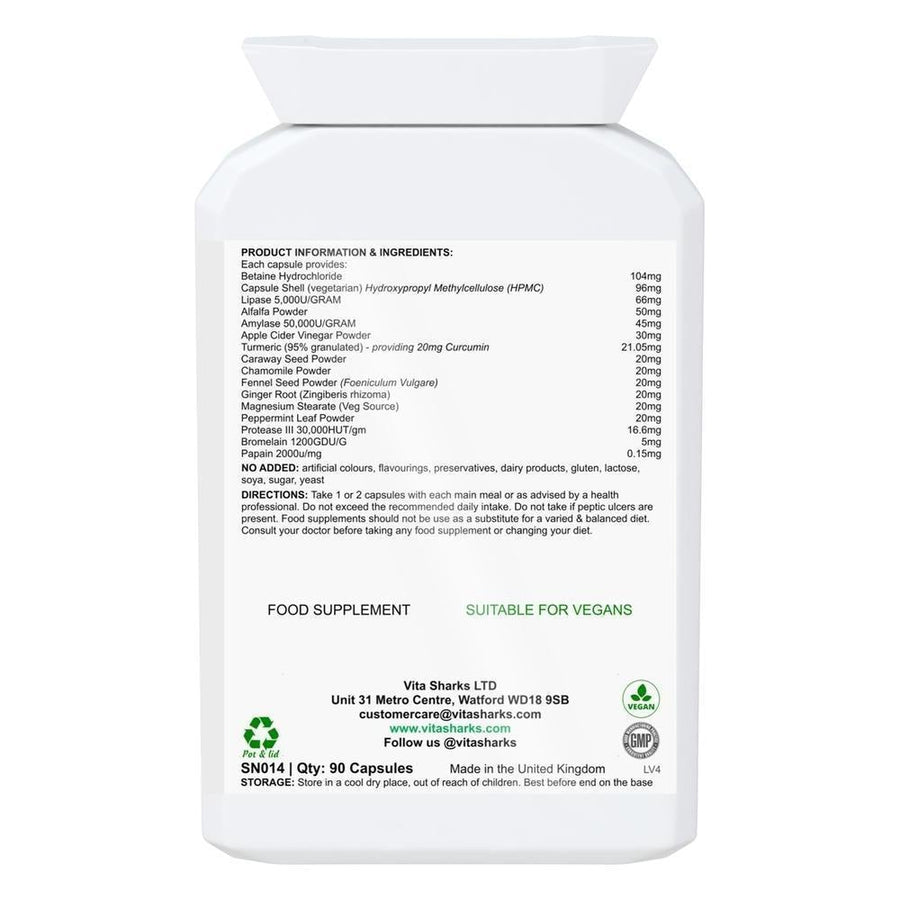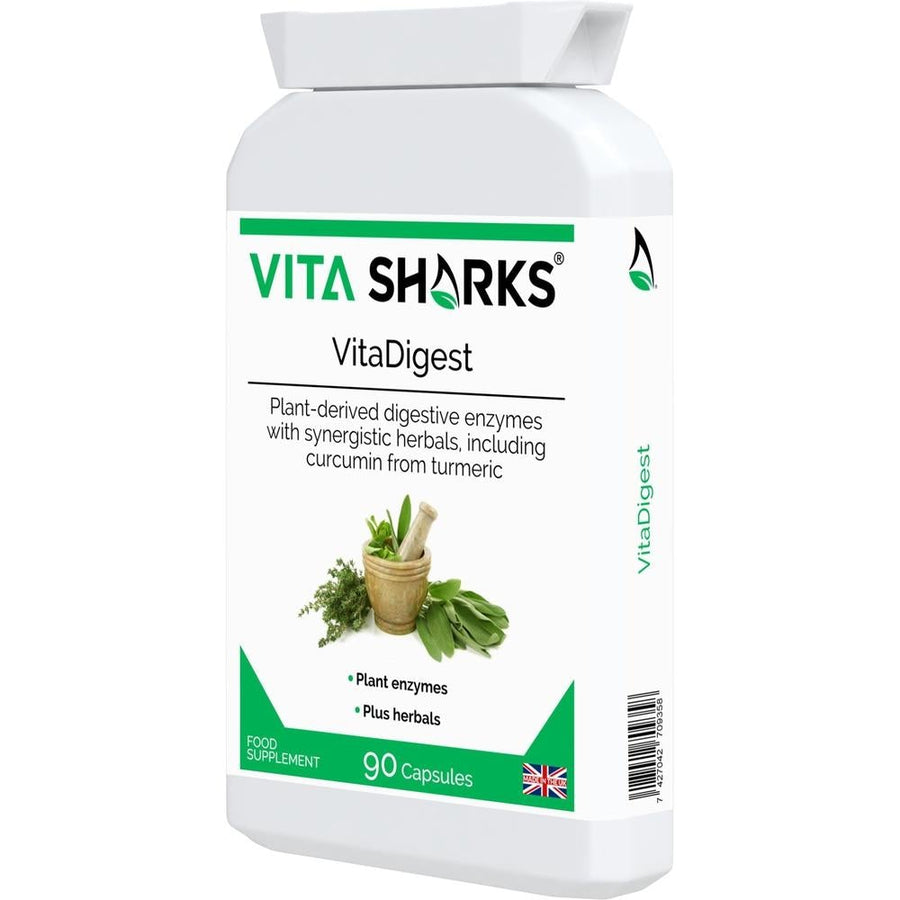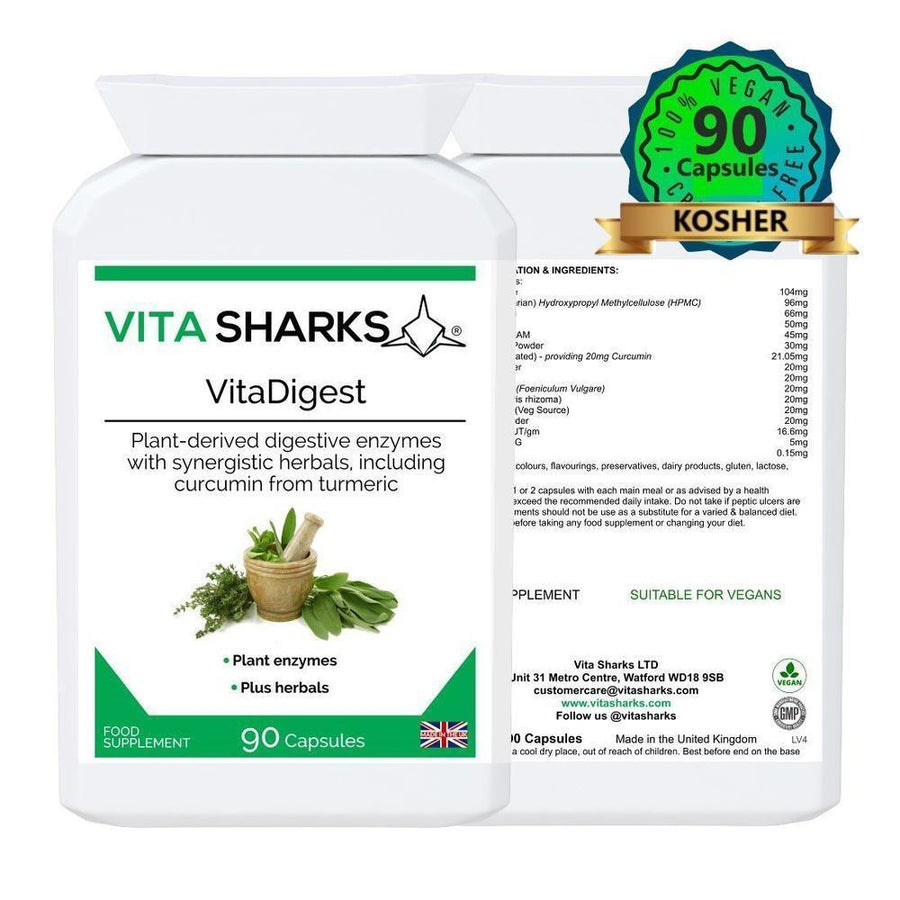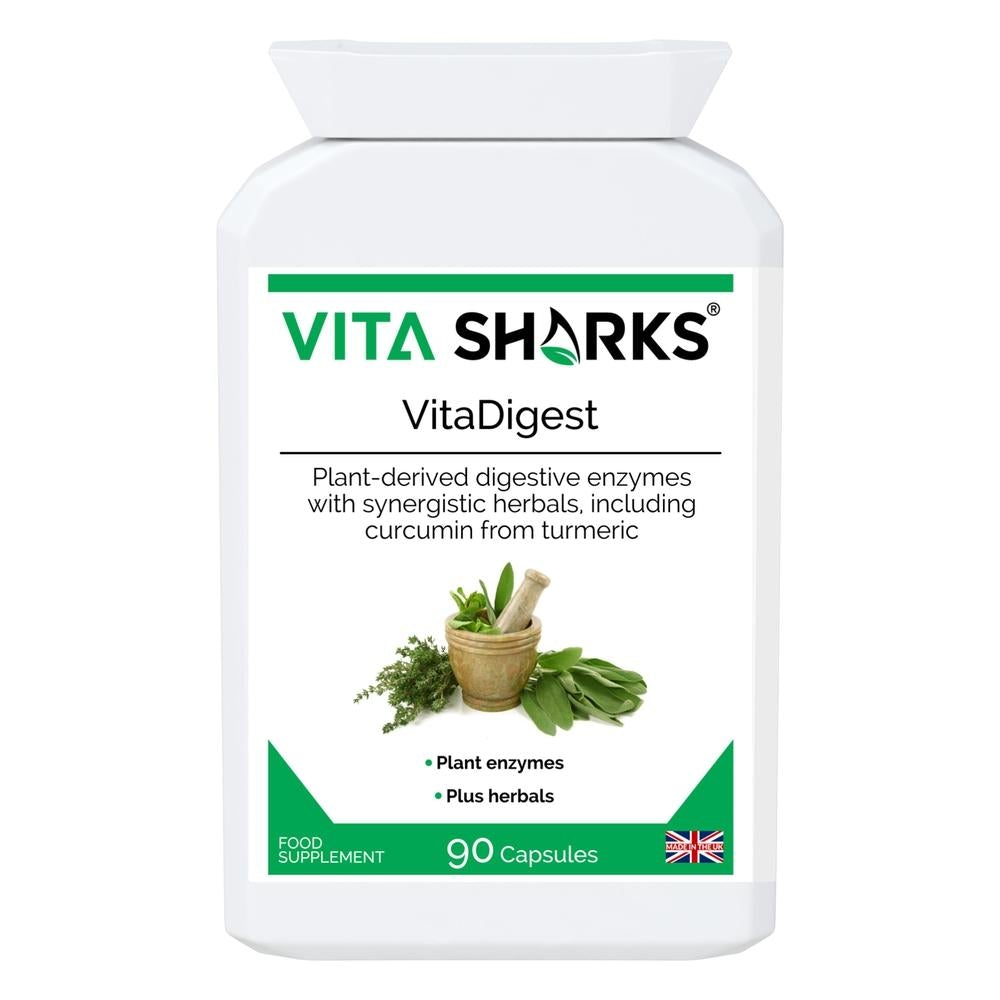
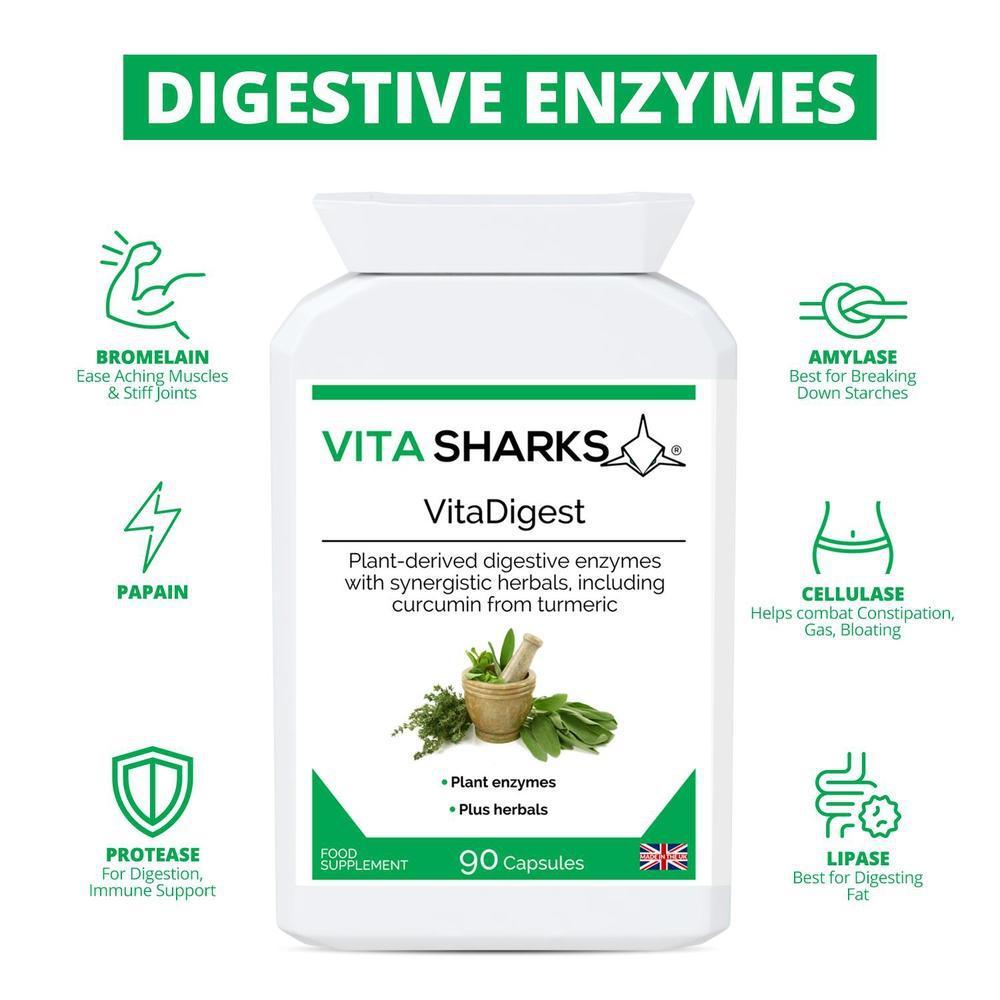

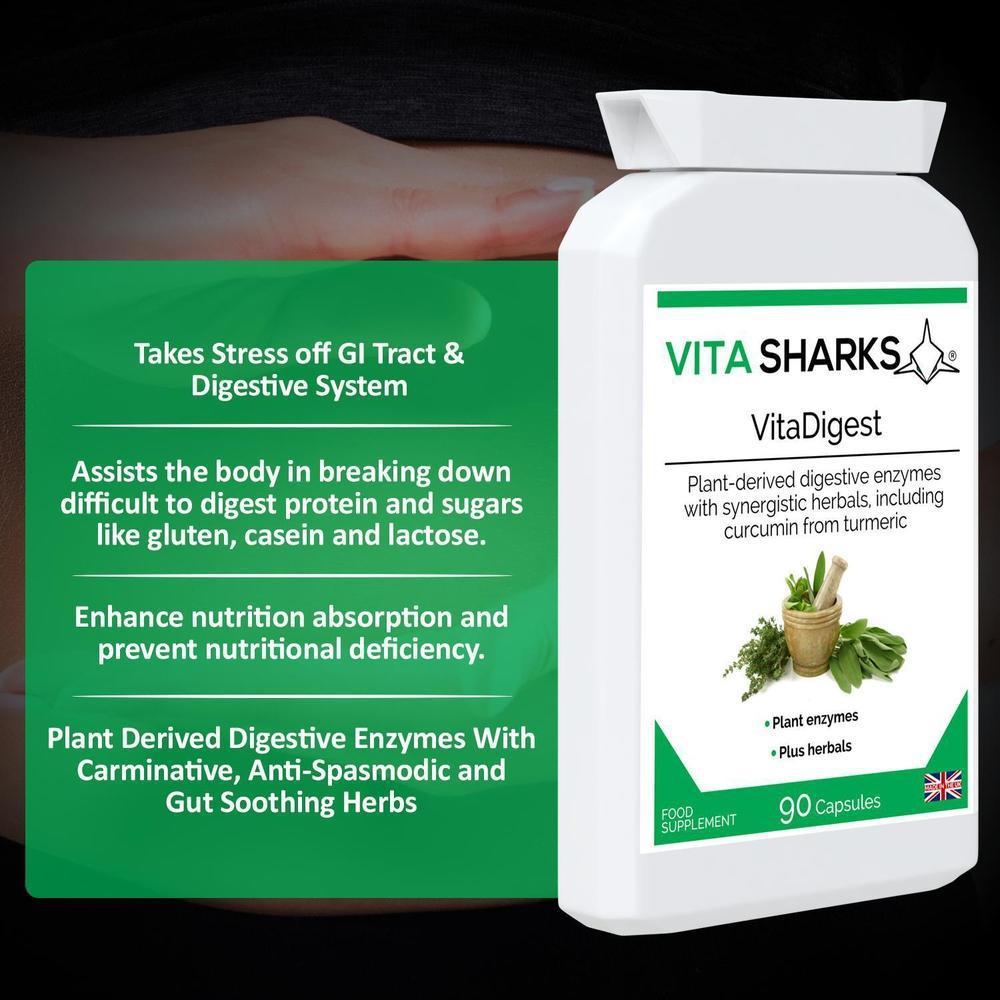


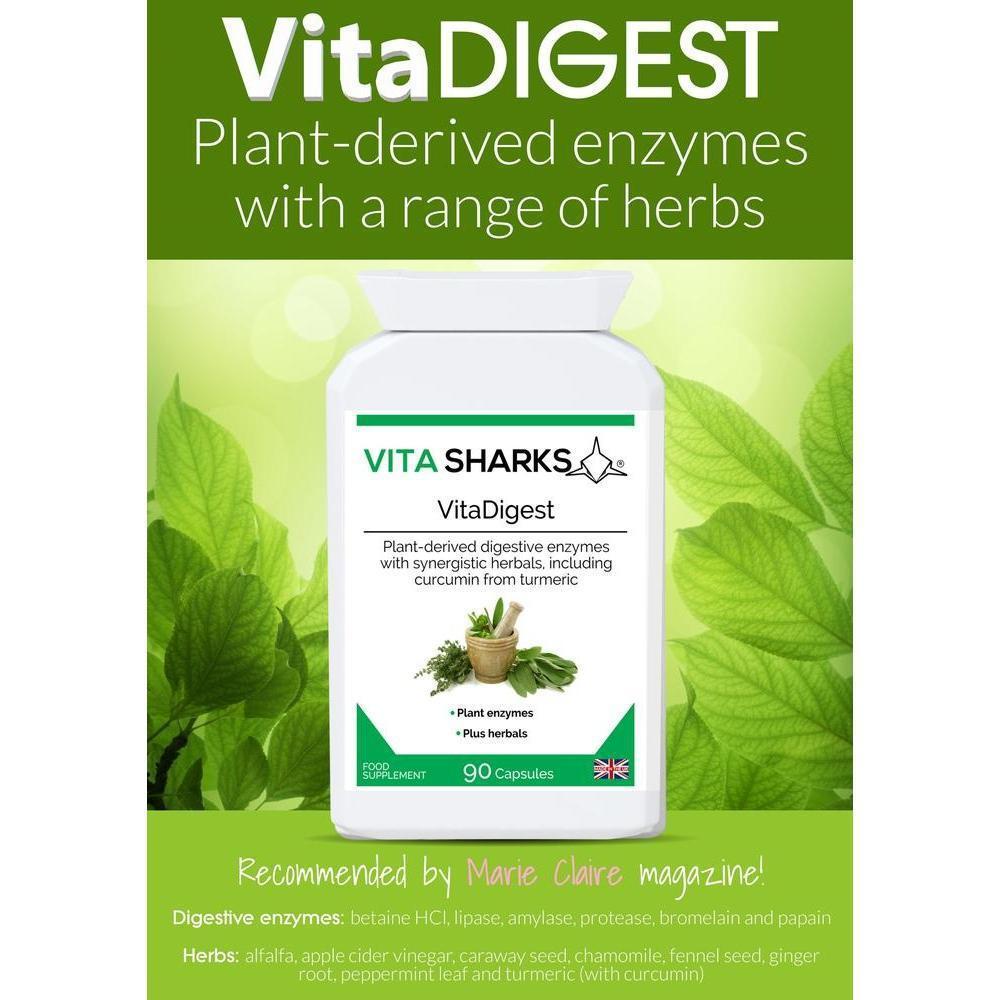
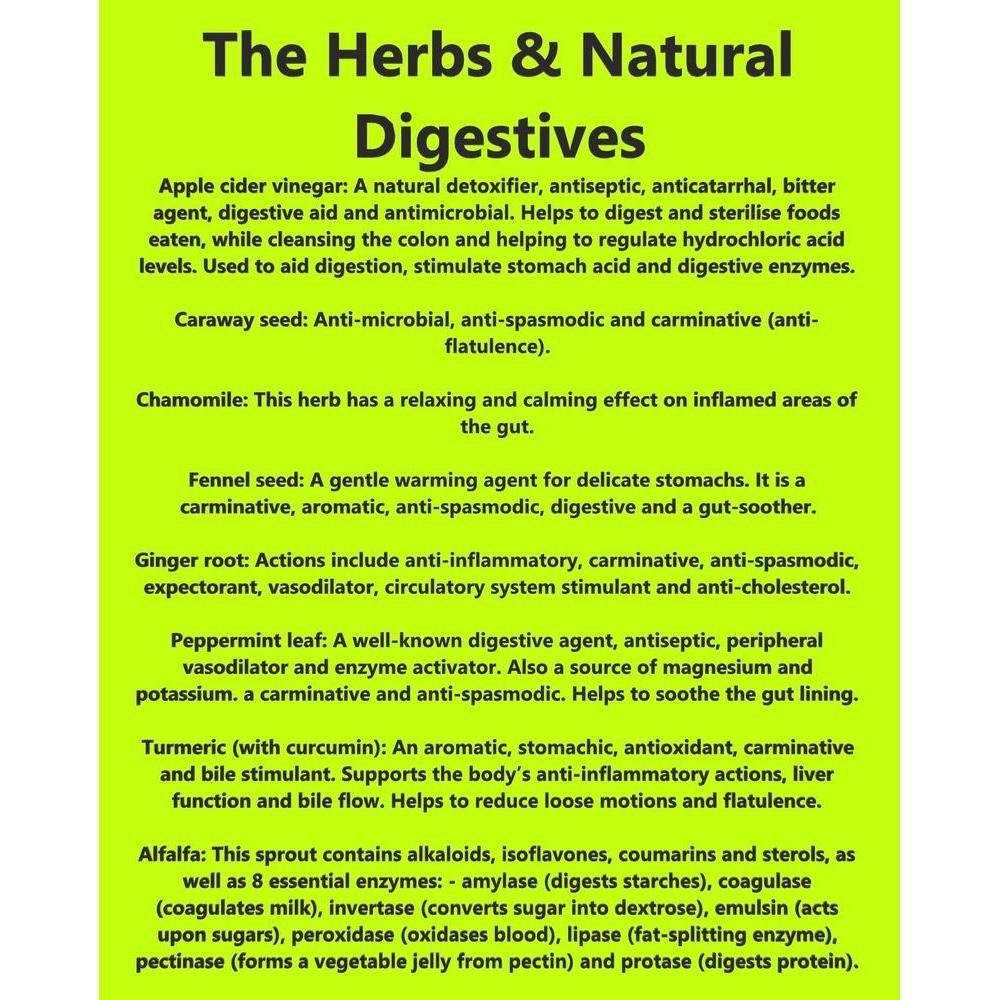
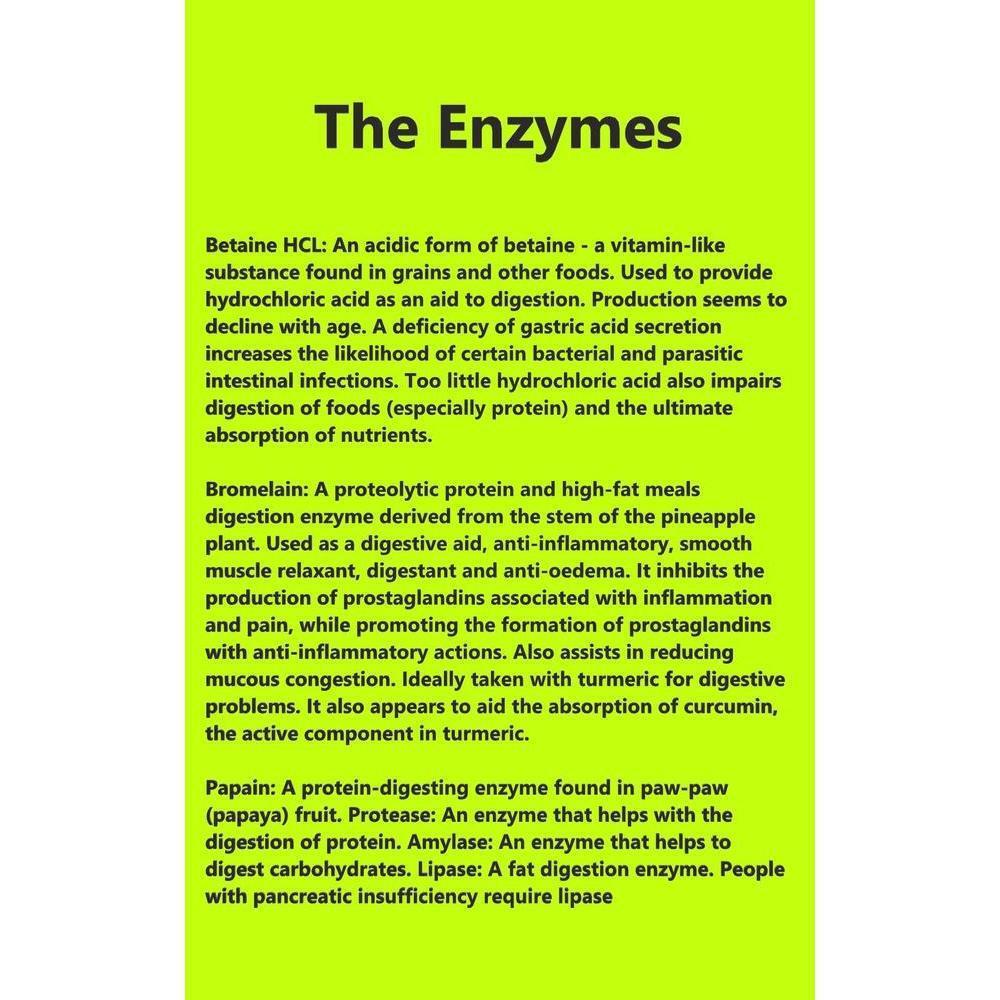
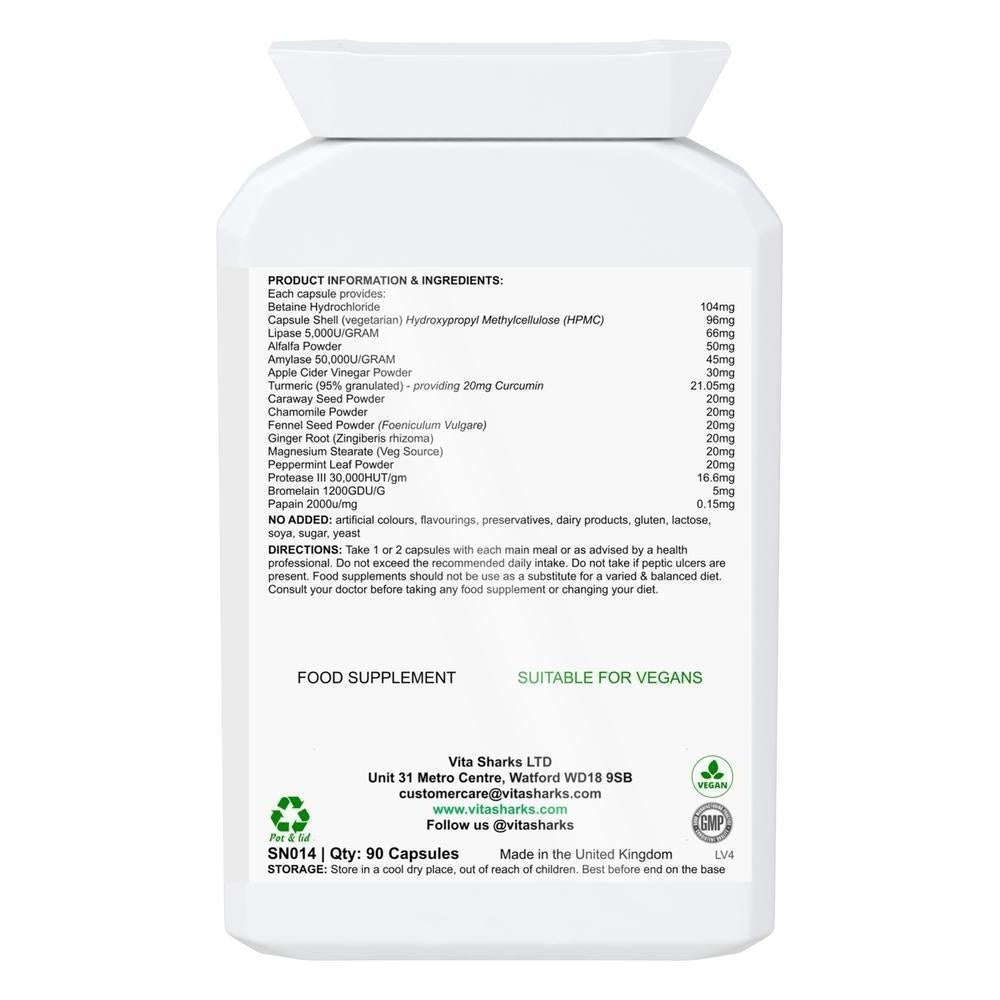
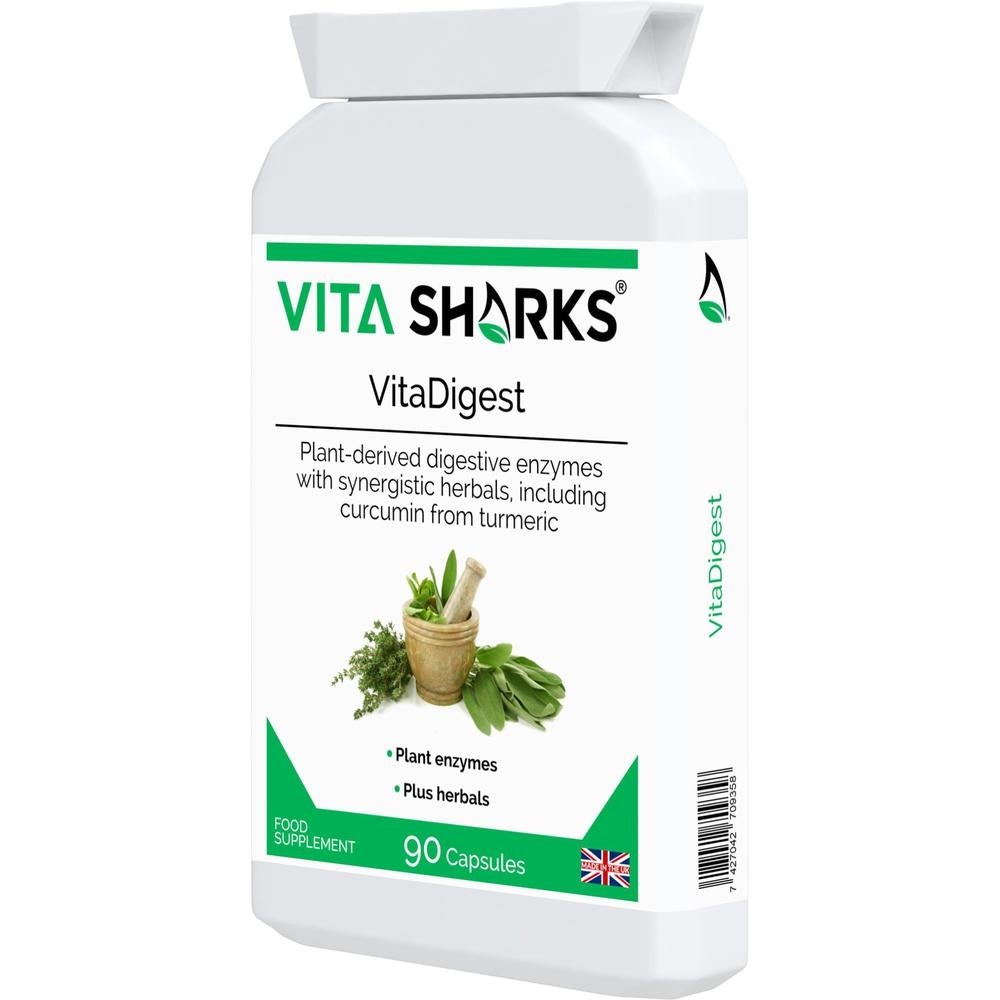
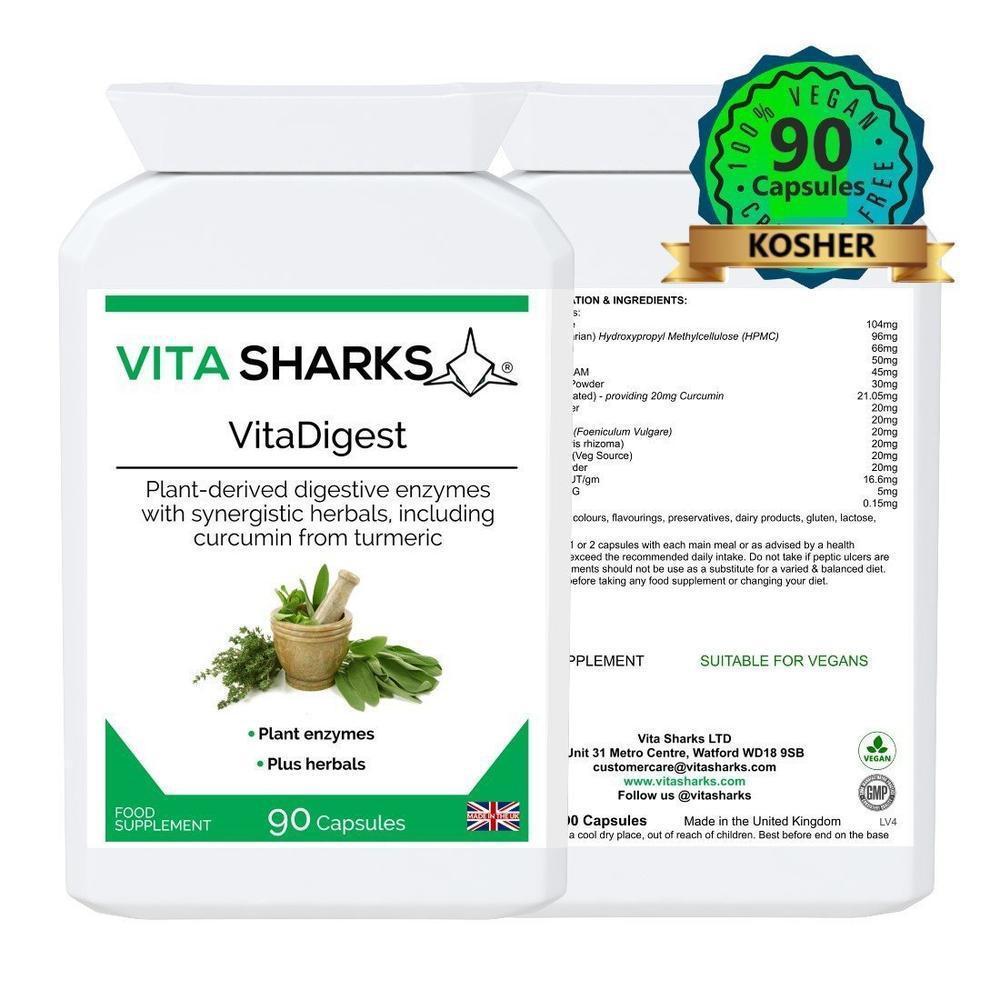
Product Information:
VitaDigest is a high-strength supplement which combines a broad spectrum range of plant-derived digestive enzymes with carminative, anti-spasmodic and gut-soothing herbs. A unique blend to aid the digestive system naturally and healthily.Digestive enzymes are important because they enable us to break down proteins, carbohydrates and fats into their raw components in order to make the nutrients available for absorption and utilisation.
Each person has a finite reserve of enzymes, which can be in short supply during times of stress, illness or as we get older. Over time, poor digestion can lead to nutrients malnutrition and a range of ailments.
90 capsules
Plant-derived enzymes (betaine hydrochloride, lipase, amylase, protease, bromelain and papain), combined with a range of herbs (alfalfa, apple cider vinegar, caraway seed, chamomile, fennel seed, ginger root, peppermint leaf and turmeric (with curcumin)).
The enzymes in this food supplement are derived from plant, fruit and vegetable sources.
- 6 plant enzymes
- 8 herbals
- With curcumin
More about the ingredients:
Apple cider vinegar: A natural detoxifier, antiseptic, anticatarrhal, bitter agent, digestive aid and anti-microbial. Helps to digest and sterilise foods eaten, while cleansing the colon and helping to regulate hydrochloric acid levels. Used to aid digestion, stimulate stomach acid and digestive enzymes.
Caraway seed: Anti-microbial, anti-spasmodic and carminative (anti-flatulence). Chamomile: This herb has a relaxing and calming effect on inflamed areas of the gut.
Fennel seed: A gentle warming agent for delicate stomachs. It is a carminative, aromatic, anti-spasmodic, digestive and a gut-soother.Ginger root: Actions include anti-inflammatory, carminative, anti-spasmodic, expectorant, vasodilator, circulatory system stimulant and anti-cholesterol.
Peppermint leaf: A well-known digestive agent, antiseptic, peripheral vasodilator and enzyme activator. Also a source of magnesium and potassium. a carminative and anti-spasmodic. Helps to soothe the gut lining.
Turmeric (with curcumin): An aromatic, stomachic, antioxidant, carminative and bile stimulant. Supports the body’s anti-inflammatory actions, liver function and bile flow. Helps to reduce loose motions and flatulence.
Alfalfa: This sprout contains alkaloids, isoflavones, coumarins and sterols, as well as 8 essential enzymes: - amylase (digests starches), coagulase (coagulates milk), invertase (converts sugar into dextrose), emulsin (acts upon sugars), peroxidase (oxidases blood), lipase (fat-splitting enzyme), pectinase (forms a vegetable jelly from pectin) and protase (digests protein)
Papain: A protein-digesting enzyme found in paw-paw (papaya) fruit.
Protease: An enzyme that helps with the digestion of protein.
Amylase: An enzyme that helps to digest carbohydrates.
Lipase: A fat digestion enzyme. People with pancreatic insufficiency require lipase.
Betaine HCL: An acidic form of betaine - a vitamin-like substance found in grains and other foods. Used to provide hydrochloric acid as an aid to digestion. Production seems to decline with age. A deficiency of gastric acid secretion increases the likelihood of certain bacterial and parasitic intestinal infections. Too little hydrochloric acid also impairs digestion of foods (especially protein) and the ultimate absorption of nutrients.
Bromelain: A proteolytic protein and high-fat meals digestion enzyme derived from the stem of the pineapple plant. Used as a digestive aid, anti-inflammatory, smooth muscle relaxant, digestant and anti-oedema. It inhibits the production of prostaglandins associated with inflammation and pain, while promoting the formation of prostaglandins with anti-inflammatory actions. Also assists in reducing mucous congestion. Ideally taken with turmeric for digestive problems. It also appears to aid the absorption of curcumin, the active component in turmeric.
Digestive enzymes
Digestive enzymes, which are only a few of the thousands of known enzymes, are complex proteins that are found in the digestive tract.
They are secreted by different glands in the body, including the salivary glands, the stomach and pancreas glands and the glands in the small intestines. They also each have specific sites of action, including the mouth, the stomach, the duodenum and the jejunum.
The human body produces around 22 different types of digestive enzymes, each of which acts on a different type of food.
The number of digestive enzymes produced by our bodies decreases as we age - enzyme production in the body actually decreases by as much as 30% in most adults over 50. Caffeine and alcohol intake, illness, pregnancy, stress, severe weather and exercise can also all take their toll on our finite enzyme reserves.
Luckily, digestive enzymes are also found naturally in fruits, vegetables, herbs and other raw foods.
Benefits of Digestive Enzymes
- Reduce stress on digestive system
- Reduce inflammation of the gut
- Improves food digestion
- Increases nutrient assimilation from meals
- Supports healthy microbiome balance
- Reduces food sensitivities and allergies
- Improves the body's immune response
- Improves cellular energy production
- Helpful for reducing autoimmunity
- Improves skin and tissue healing
Each capsule provides:
Betaine hydrochloride - 104mg
Capsule shell (vegetarian) Hydroxypropyl Methylcellulose (HPMC) - 96mg
Lipase 5,000U/GRAM - 66mg
Alfalfa powder - 50mg
Amylase 50,000U/GRAM - 45mg
Apple cider vinegar powder - 30mg
Turmeric (95% granulated) - providing 20mg curcumin - 21.05mg
Caraway seed powder - 20mg
Chamomile powder - 20mg
Fennel seed powder (Foeniculum vulgare) - 20mg
Ginger root (Zingiberis rhizoma) - 20mg
Magnesium stearate (veg source) - 20mg
Peppermint leaf powder - 20mg
Protease III 30,000HUT/gm - 16.6mg
Bromelain 1200GDU/G - 5mg
Papain 2000u/mg - 0.15mg
Warning:
Do not take if peptic ulcers are present.







SKU:

